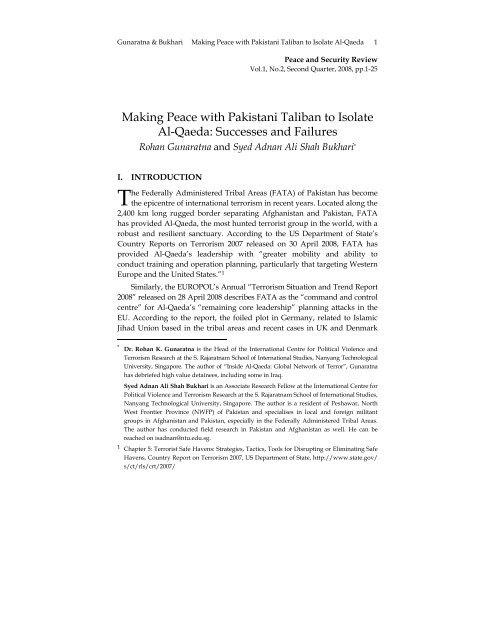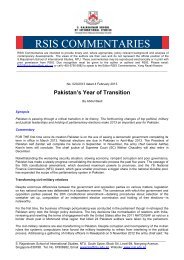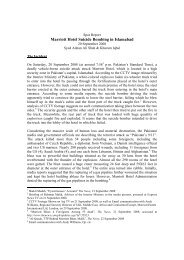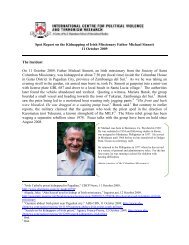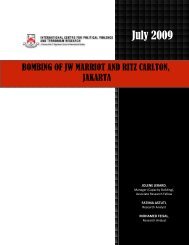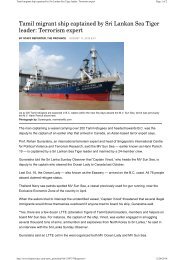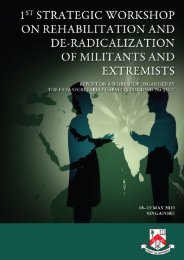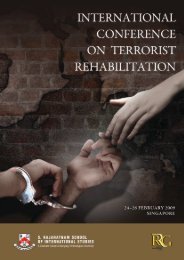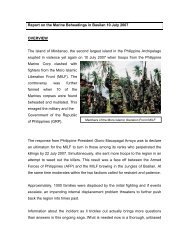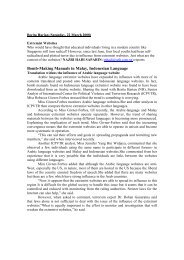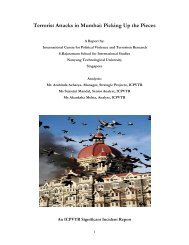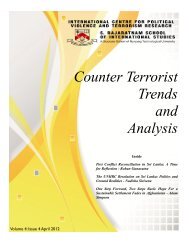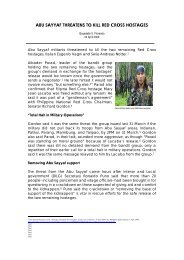Peace and Security Review, Vol.1 No. 2 - International Centre for ...
Peace and Security Review, Vol.1 No. 2 - International Centre for ...
Peace and Security Review, Vol.1 No. 2 - International Centre for ...
Create successful ePaper yourself
Turn your PDF publications into a flip-book with our unique Google optimized e-Paper software.
Gunaratna & Bukhari Making <strong>Peace</strong> with Pakistani Taliban to Isolate Al-Qaeda 1<br />
<strong>Peace</strong> <strong>and</strong> <strong>Security</strong> <strong>Review</strong><br />
<strong>Vol.1</strong>, <strong>No</strong>.2, Second Quarter, 2008, pp.1-25<br />
Making <strong>Peace</strong> with Pakistani Taliban to Isolate<br />
Al-Qaeda: Successes <strong>and</strong> Failures<br />
Rohan Gunaratna <strong>and</strong> Syed Adnan Ali Shah Bukhari *<br />
I. INTRODUCTION<br />
T<br />
he Federally Administered Tribal Areas (FATA) of Pakistan has become<br />
the epicentre of international terrorism in recent years. Located along the<br />
2,400 km long rugged border separating Afghanistan <strong>and</strong> Pakistan, FATA<br />
has provided Al-Qaeda, the most hunted terrorist group in the world, with a<br />
robust <strong>and</strong> resilient sanctuary. According to the US Department of State’s<br />
Country Reports on Terrorism 2007 released on 30 April 2008, FATA has<br />
provided Al-Qaeda’s leadership with “greater mobility <strong>and</strong> ability to<br />
conduct training <strong>and</strong> operation planning, particularly that targeting Western<br />
Europe <strong>and</strong> the United States.” 1<br />
Similarly, the EUROPOL’s Annual “Terrorism Situation <strong>and</strong> Trend Report<br />
2008” released on 28 April 2008 describes FATA as the “comm<strong>and</strong> <strong>and</strong> control<br />
centre” <strong>for</strong> Al-Qaeda’s “remaining core leadership” planning attacks in the<br />
EU. According to the report, the foiled plot in Germany, related to Islamic<br />
Jihad Union based in the tribal areas <strong>and</strong> recent cases in UK <strong>and</strong> Denmark<br />
* Dr. Rohan K. Gunaratna is the Head of the <strong>International</strong> <strong>Centre</strong> <strong>for</strong> Political Violence <strong>and</strong><br />
Terrorism Research at the S. Rajaratnam School of <strong>International</strong> Studies, Nanyang Technological<br />
University, Singapore. The author of “Inside Al-Qaeda: Global Network of Terror”, Gunaratna<br />
has debriefed high value detainees, including some in Iraq.<br />
Syed Adnan Ali Shah Bukhari is an Associate Research Fellow at the <strong>International</strong> <strong>Centre</strong> <strong>for</strong><br />
Political Violence <strong>and</strong> Terrorism Research at the S. Rajaratnam School of <strong>International</strong> Studies,<br />
Nanyang Technological University, Singapore. The author is a resident of Peshawar, <strong>No</strong>rth<br />
West Frontier Province (NWFP) of Pakistan <strong>and</strong> specialises in local <strong>and</strong> <strong>for</strong>eign militant<br />
groups in Afghanistan <strong>and</strong> Pakistan, especially in the Federally Administered Tribal Areas.<br />
The author has conducted field research in Pakistan <strong>and</strong> Afghanistan as well. He can be<br />
reached on isadnan@ntu.edu.sg.<br />
1 Chapter 5: Terrorist Safe Havens: Strategies, Tactics, Tools <strong>for</strong> Disrupting or Eliminating Safe<br />
Havens, Country Report on Terrorism 2007, US Department of State, http://www.state.gov/<br />
s/ct/rls/crt/2007/<br />
<strong>Vol.1</strong>, <strong>No</strong>.2 2008 pp.1-25


